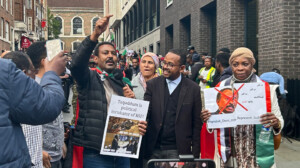Nomads in West Darfur demand peace, justice and public services
Nomads in West Darfur organised a vigil in front of the state government offices in El Geneina yesterday. In El Fasher, North Darfur, preparations started for the Constitutional Conference planned to be held in the country.
 Nomads called for peaceful coexistence in the West Darfur capital El Geneina yesterday (RD)
Nomads called for peaceful coexistence in the West Darfur capital El Geneina yesterday (RD)
Nomads in West Darfur organised a vigil in front of the state government offices in El Geneina yesterday. In El Fasher, North Darfur, preparations started for the Constitutional Conference planned to be held in the country.
A memorandum containing 20 demands was handed to the newly appointed civilian governor, Mohamed El Doma. The demonstrators seek peace, disarmament in the region, and neutrality of the regular forces. They also seek an inclusive conference about peaceful coexistence with the participation of all communities in West Darfur.
Displaced and refugees must be able to return to their places of origin, where basic services must be provided, the demonstrators demanded.
The memorandum said that detained nomads must either be released or brought to justice. They want the state government to secure pastures and farms, and provide nomads with basic and public services.
The governor affirmed his government's commitment to conduct a community dialogue in the state. He called the demands presented in the memorandum “legitimate and logical”. “We will work to implement what lies in our capacity,” he said.
North Darfur
In the North Darfur capital of El Fasher, political forces and civil society organisations launched a campaign in preparation of “an inclusive conference to prepare a permanent Constitution, and to sustain democracy and the peaceful transfer of power”.
The campaign was launched at the end of a conference about the procedures and structure of a national Constitutional Conference, which was organised by the Sudanese Development Organisation (SUDO), in cooperation with the British Foreign Office and the Commonwealth Office.
Civil society activist Zahra Abdelnaeem emphasised the importance of setting aside political ideologies and regional identities, and work together for the unity of Sudan “through a Constitution that everyone agrees upon”.
Radio Dabanga’s editorial independence means that we can continue to provide factual updates about political developments to Sudanese and international actors, educate people about how to avoid outbreaks of infectious diseases, and provide a window to the world for those in all corners of Sudan. Support Radio Dabanga for as little as €2.50, the equivalent of a cup of coffee.












 and then
and then